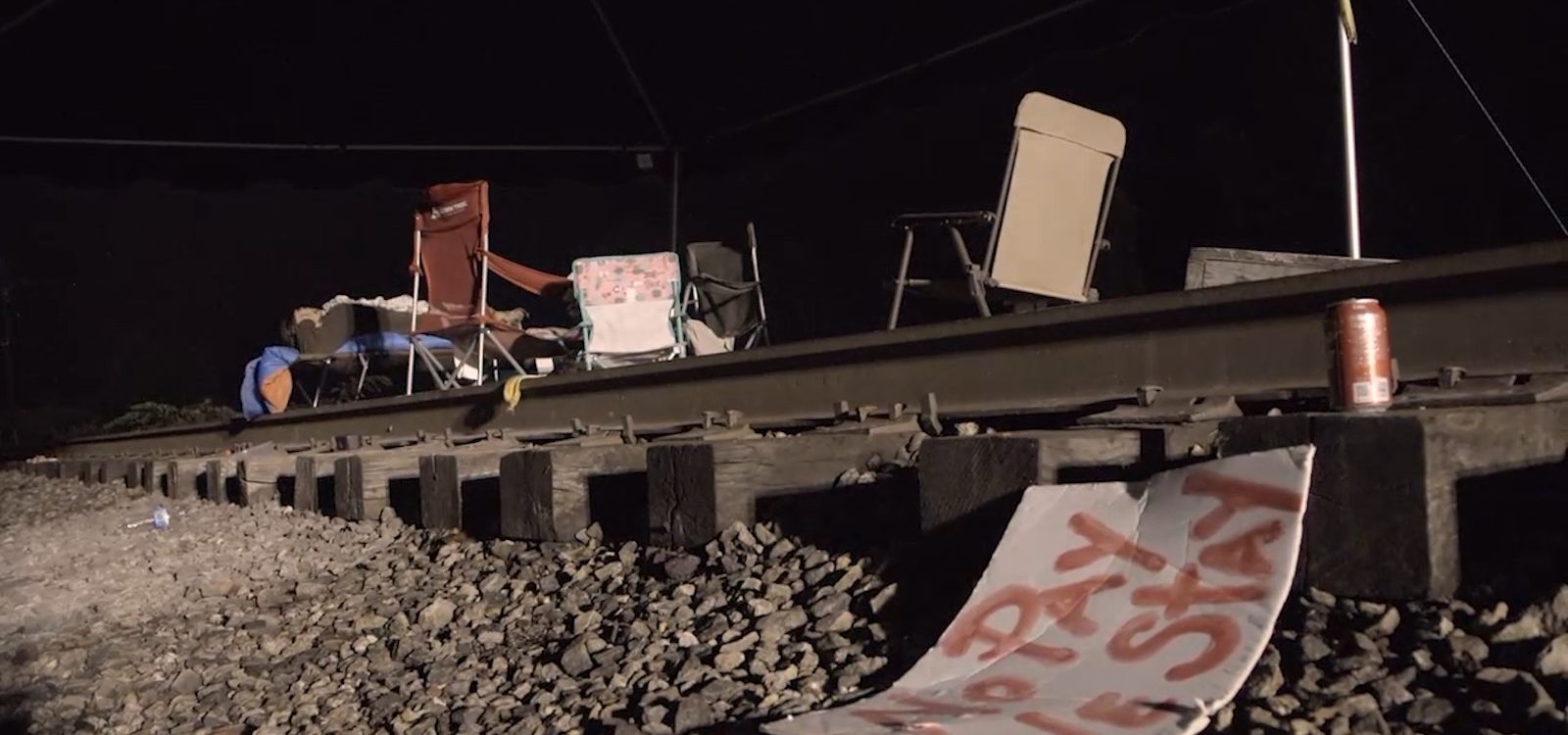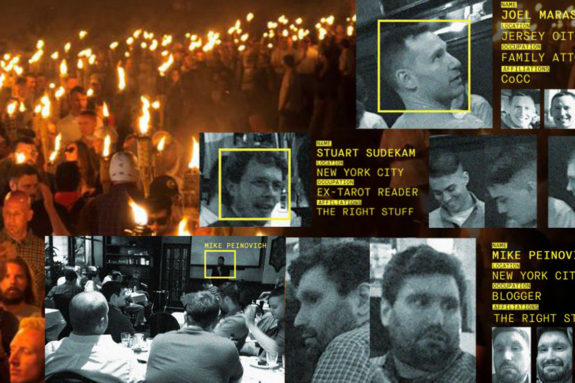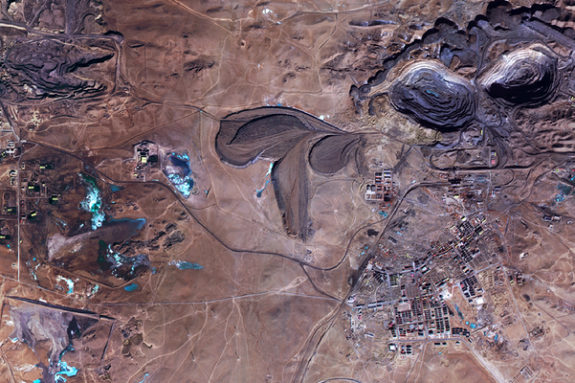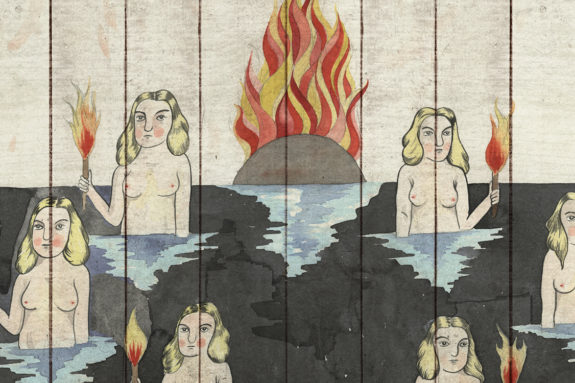Beside the deep mines of working-class history, blocking the tracks unlocks the future.
Just past the Southeast Kentucky Community & Technical College, the railroad to the Cloverlick Mine runs parallel to the road. Before last summer, this was a quiet place, a sleepy community called Cumberland, in Harlan County, residing in the shadow of Pine Mountain: a high, long ridge running up the spine of the Kentucky–Virginia border. This is the coal miners’ heartland, or it had been, that is, until the Blackjewel coal company filed for bankruptcy in July of 2019, and eighteen hundred coal miners lost their jobs.
Not only were the miners out of work, they were also not paid for their final month, leaving hundreds of employees without a paycheck as back-to-school shopping demands loomed. During a time of year when some miners would normally take time off to spend with their families, they spent July on the railroad tracks blocking the passage of a train loaded with coal they had chipped from the ground entirely for free. Workers vowed to stay on the tracks until they received the wages they were owed.
Harlan County has long been the site of struggle between coal miners and the companies they work for. The power of coal miners was broken long ago during the lengthy, violent series of battles in the 1930s between unions and bosses that earned Harlan County its moniker, “Bloody Harlan.” It’s a storied place, and miners and supporters alike would use the lore of Harlan throughout the summer to propel the struggle to visibility.
On one of the first nights at the blockade camp, in the midst of a heavy rainstorm, a number of the young men on the tracks began to sing a famous song of local infamy—a battle cry, a lamentation, and a warning. “You’ll never leave Harlan alive,” they sang, an ode to decades of hard times in Eastern Kentucky. Coal companies have spent years creating a climate of scarcity and desperation around the precious coal jobs in one of the last Appalachian states with a high number of active deep mines.
The miners came out to block the tracks about a week after they learned they’d lost their jobs and a month’s pay. Theirs was a wildcat action, with no union backing. Some with families, some without, the workers were prepared to spend the stormy nights of an Appalachian midsummer outside. Later, those in solidarity with them came from over the mountain and across the nearby counties to bring water, to take miners’ families shopping, to sit on the track, or just to talk and to listen. This was followed by reporters; first from the local stations and papers, then from regional outlets, and finally, from national media.
As support for the miners poured in, their families and members of surrounding communities continued to cycle in and out of what was now becoming a protest camp, staying from early in the morning until late at night. Everybody brought food: casseroles, cakes, spaghetti, boxes and boxes of Little Caesars pizza, so much food that some had to be thrown away. Socialists and Trump supporters alike showed up wearing their campaign shirts. People came from near and far to bear witness to one of the first major miners’ action in the state in decades.
A key contingent swift to put their bodies in the blockade was queer and trans leftist comrades. Though many came from states as far away as New York, some were from the local area, ready to support the occupation by whatever means possible. There was much made of this alliance at the time, and rightfully so: it was groundbreaking. But like many movements, the intricacies of relationships and camaraderie are much messier up close. One of the key lessons of the Blackjewel blockade is how difficult—and how deeply important—sharing the fight can be.
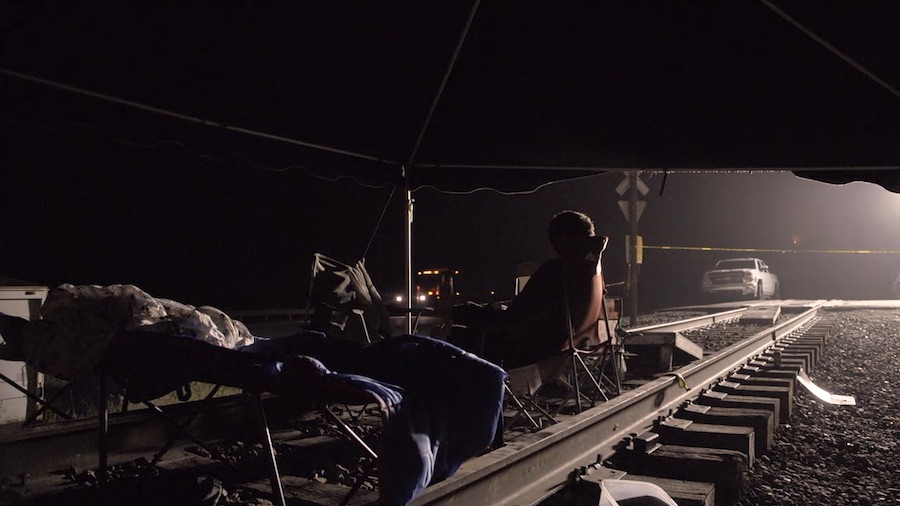
What makes labor movements possible, beyond those on the frontlines, is the full spectrum of support a community can give. Without meals, childcare, and clothes and shoes for children to wear, wildcat strikes and blockades, which by definition occur without the backing of a union, can fade and dissolve into nothing.
The term “mutual aid”—referring to a common experience of voluntary donation of labor and resources that build bridges between communities and strengthen collective power—isn’t immediately familiar to most folks. Many practice mutual aid regardless, and what happened in the summer of 2019 in the community around Cloverlick can’t be described any other way. According to L., a trans anarchist with a background in organizing mutual aid spaces who became an integral part of the blockade camp, these varied acts of support reflected a strength in the camp and the historic strength of Harlan County communities. “When I saw the coal miners were staying overnight and maintaining their blockade . . . I knew I had to get there,” says L. “I knew that between me and our crew, and community members from all over Harlan county, we could make it last.”
L., a veteran of direct-action campaigns and a proudly out nonbinary person with roots in the Eastern Kentucky punk scene, grew up across Pine Mountain and went to high school with some of the miners. They had been away from the area for a year. As L. saw the blockade forming, they knew that they had the expertise, connections, and organizing skills to help make the camp last. They quit their food service job and drove their truck down to the railroad tracks. With some help from friends (and Venmo and CashApp), they set about purchasing supplies at a local Walmart. Tarps, tents, and coolers all went into trucks, as well as bags of dry goods and nonperishables, a camping stove, and a lot of plastic tubs. By the end of the week, L. and their comrades—self-identified anarchists, certainly leftists and all queer and trans—had set up a fully stocked camp kitchen at the tracks, complete with items for breakfast, lunch, and dinner.
In addition to supplies, L. had brought with them intangible goods: social media connections to the eager eyes and ears of other queer, young people excited at the prospect of an unlikely alliance. It felt as though young people were hungry for a moment like this, a chance to step into an age-old struggle, and to make it new. The anarchist group started an Instagram, @blackjewelminersblockade, and the donations came pouring in. Once the account began gaining traction, the story started to grab the eyes and ears of veteran queer activists all over the world.
It was a sleepy July morning at the camp when famed British activist Mike Jackson, a founding member of Lesbians and Gays Support the Miners (LGSM), called. “I had done an overnight security shift,” says L. “So I didn’t know what to do except squeal when he called and woke me up in my tent.”
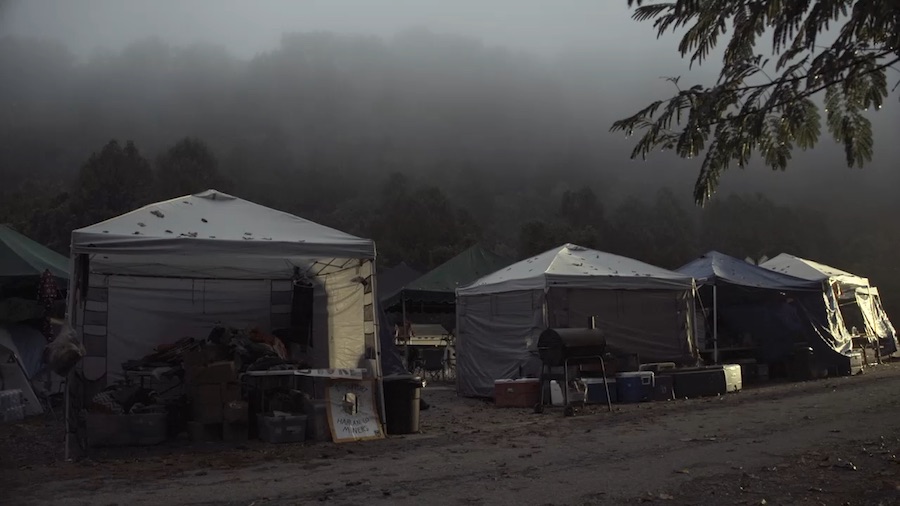
Jackson had noticed the anarchists’ punchy online presence and offered to help fundraise internationally. With his help, the group brought in over thirty-thousand dollars—enough to set up a more permanent kitchen, provide for the children who played with chalk on the railroad tracks, and send families home with dinner every night.
LGSM formed in the 1980s to support a miners’ strike in Wales. Like L.’s group of punks, LGSM hoped to build connections between working-class queer folk and the more traditional, conservative miners who fought for universal needs like fair wages, benefits, and childcare. Many of the LGSM organizers did not come from privilege or wealth. They called themselves “street toughs.” They were young punks, but also politically committed with a sense for the cruelty the world can deliver to persecuted groups. Many members were affiliated with communist and socialist groups in London.
LGSM had raised money for Welsh miners, many of whom, with time and deep, long-term relationship building efforts, welcomed members of LGSM like family. The passion with which LGSM hit the pavement proved their profound dedication to the cause of building power and fighting injustice, rather than battling other workers over scraps. L. believed that, like LGSM, their crew’s commitment to mutual aid principles allowed differences to be bridged in the name of working-class solidarity against the boss.
Queer issues and labor issues are often grouped separately. Positive queer visibility regularly comes from popular culture, from media worlds populated by glitter and glistening, by rich queers with fashionable taste, whose sentiments of inclusion rarely extend to boots-on-the-ground dirty work. Even popular culture produced by queer people, such as Queer Eye and RuPaul’s Drag Race, often depict queer folk as decadent, fashionable, and wealthy. This is, of course, not the reality for most queer and trans people. Poverty and homelessness among these groups is high, especially so for those with multiple marginalized identities.
Miriam Frank, a longtime chronicler of queer labor history, discusses this in her 2014 book, Out in the Union: A Labor History of Queer America. Whether central to campaigns and movements or in support roles, people with a variety of sexual and gender identities have always held the picket line. Frank describes instances in the early twentieth century in which young, queer boilermakers, steelworkers, garment workers, and other trade unionists fought for recognition and respect within the workplace and their unions. The young people who came to found what they called “A-Camp” in the Blackjewel blockade were mostly working-class youth from Appalachia, if not from Kentucky itself.
For a full month, the blockade camp in Kentucky ran smoothly. Friends from Philadelphia, West Virginia, Tennessee, and New York came to assist. For some, occupations are a way of life with familiar trappings: the whiteboard in the kitchen, the camp phone with a hotspot on it, the task list with roles rotating every few days. Then there’s the security shift. Every night in the blockade camp, a couple of people would sit watch on the railroad tracks underneath a tent, side-lit by the glare of a stadium light donated by the United Mine Workers of America. Pine Mountain turns blue in the morning, then gray, then purple, then gold. This summer, the morning mist would roll in almost instantaneously, curling around the tents, draping over the space between hills like a veil. Some of the miners would stay out in lawn chairs by the road all night, waving at passing cars, listening for telltale honks of support.
A-Camp was deeply invested in childcare, a task often undervalued as a need in some male-dominated sectors of the labor movement. Without the camp’s help, it might have been left to the miners’ wives, whose twenty-four-hour support was already time-consuming and draining alongside their existing job and family obligations. Queer youth watched the miners’ children when their wives were busy. They raised money especially for kids and solicited crayons, chalk, and school supplies. Kids at camp had a good time. When A-Camp eventually packed up to leave, some of the kids got upset. Their mothers were upset too, torn between standing by the decisions they had made and missing the friendships they had cultivated in their time at camp.
Solidarity carries risk. Mayor Charles Raleigh of Cumberland and the police worked hard to discredit the ties built between A-Camp and the coal miners, going so far as to accuse the queer and leftist youth of fraud and laundering. A-Camp’s satirical use of the slogan “pits and perverts”—a legacy of LGSM’s cheeky outreach strategy—led to misunderstandings and disgust from church and political leaders. A seemingly deliberate misreading of the slogan led Raleigh to declare that these anarchists were merely rabble-rousers from Pittsburgh, not hardworking local kids.
Playing on the age-old “outside agitator” script is useful for politicians, and the tactic can be become more powerful once leftists are branded as suspicious strangers. Coal is useful as a nationalist project and useful to the managerial and owning class within Appalachia as a propaganda tool. As long as folks believe that coal is coming back, it is possible to imagine that anyone who stands remotely in opposition to the industry is standing against the health of the community. The worker comes to identify with the industry, rather than identifying with other workers.
It also benefits the narratives of the Christian right to ostracize queer, pro-union environmentalists like L. Since the 1980s, the Christian right in Appalachia has positioned itself as the defender and upholder of the white working man, pitting an idealized, white working class against the weirdos and commies who fought for the benefits and protections that strengthen communities against the ruling class.
The miners, though hard workers with a commitment to the collective good of their brothers-in-arms, are not dedicated leftists. They regularly expressed that they were “normal guys” looking for a paycheck. A righteous cause, worthy of support but by no means necessarily revolutionary.
“I knew that between me and our crew, and community members from all over Harlan county, we could make it last.”
At times, friction between parts of the camp arose. For the most part, disagreements were resolved with facilitated camp meetings. Camp was designated as a sober space, for instance. Rules about the camp phone and the intake of donations were laid out and improved as more contributions poured in. Even as more northeastern anarchists arrived to offer support, the friction caused by cultural misunderstandings generally gave way to camaraderie as the new arrivals demonstrated their good will and work ethic. That changed with the arrival of a labor rights trucker group, Black Smoke Matters (BSM), a month and a half after the blockade began.
Some of the truckers represented support for the miners from right-wing groups whose ideas of solidarity extended only to white men in stereotypically masculine jobs (BSM also supports loggers, steelworkers, and autoworkers). One of the truckers overtly displayed neo-Nazi sympathies. When he rolled into camp, he bragged about his guns, making jokes at the expense of various marginalized people. Many of the anarchists saw him as a threat.
After a camp meeting, in which serious concerns about the man’s presence were raised by A-Camp and others, the miners decided against ejecting him from the space on the grounds that everyone who wanted to be there deserved to be there. The anarchists, some of whom were black and Jewish, all of whom were avowed antifascists, took it as a sign that they were no longer safe at camp. They packed up and left that night, leaving behind a bewildered blockade family, whose reactions were a mixture of defensiveness, betrayal, regret, and confusion. Many who had declared themselves apolitical in the beginning remained solidly so, saying they couldn’t understand why it was so difficult for A-Camp to accept help and support from all sides of the political spectrum. The more help, they believed, the better.
L. says they are waiting until the dust settles to reflect with depth on what happened. They maintain good relationships with many of their friends among the coal mining families and the Southeast Kentuckian communities around Pine Mountain are home. L. believes that queer people in Eastern Kentucky deserve to insert themselves into labor history as it happens and to be a part of making the future in the area. But such acts of solidarity carry the heaviness that many young, left, LGBTQ Appalachians experience upon returning home from college, work, and other travels. Rawness, hurt, and misunderstanding, hand in hand with love and care.
L. isn’t shy about expressing their heartbreak over the end of A-Camp. They wonder, they say, “about the anti-racist work we had done for a month and if it had any impact.” With a thoughtful pause, they add, “But I know that it did.”
After two long months, at the end of September, the blockade disbanded. Though back wages had not yet been won, school had started for the families and the miners were running out of money. The miners’ lawyer continued the fight for pay, and shortly thereafter, the miners received a significant win. In mid-October, 2019, Federal courts in Kentucky, Virginia, and West Virginia made public a series of settlements showing that Blackjewel had agreed to pay $5.1 million in unpaid wages to roughly 1,100 workers. The blockade should be remembered, then, as an incredible achievement, probably helped in no small part by the infrastructure and culture of meetings and collaboration developed with A-Camp.
In Bloody Harlan and elsewhere, the fight goes on. Where there is a history of struggle, there are also trails of losses. And where there have been concerted efforts to break working-class power, there have been blows designed to break the spirit of queer people, radicals, and anyone else whose life does not mesh with the imperatives of capital. Anti-sodomy and anti-gay marriage laws have always thrived in those states with right-to-work laws; the power nexus of conservative politics and the fossil-fuel industry thrives when the working class is divided. As a right-to-work state, labor in Kentucky is so weak and divided that it is a struggle for unions to merely maintain membership, let alone have an intersectional strategy.
Unions have a somewhat tortured relationship with LGBT-rights movements, especially some of the more typically masculine industrial unions, like those in the steel and auto industries. These unions are historically home to conservative, nationalist sentiments, centered more closely around the experience of being an American worker than being a part of a global, intersectional working class. The work L. and their comrades did to rebuild bridges burned by capitalism and to work with miners to show that power can be shared and built from the ground, rather than received and allotted from above, is always worth doing. Additionally, in the spirit of mutual aid, perhaps such efforts will bear fruit from distant branches in the form of further support and more understanding for queer Appalachians and their fighting spirit.
The Blackjewel blockade was a historic moment—strife and trouble don’t negate that. While coal miners have been pummeled by industry bosses and political elites for decades, they continue to occupy a particular, mythologized place in the American collective consciousness. They are endowed with a storied stoicism; like soldiers or firefighters, they represent an image of dangerous work, or sacrifice, for family and—with a dash of grim nationalism—for country. It doesn’t hurt that—at least in Kentucky in 2019—most coal miners are white men.
So what happens when queer folks lead movements in Appalachia? Throughout the region, queer people are already leading a variety of other struggles. Whether they are fighting for abortion clinics, lobbying against discrimination in schools, or starting their town’s first Pride, queer activists are engaged in countless struggles that intersect with queer liberation, in workplaces and beyond.
The blockade has disappeared from headlines but ripples from it remain. In Pike County, Kentucky, in January, after their checks were late, miners blocked the tracks leading to Quest Energy’s mines, activating some of the solidarity networks put in place in Harlan County. They were paid almost immediately. As for miners in Harlan, few have found work in the county, and many have left the state and the coal industry in search of stable employment. While the national media metabolized the news of the blockade at its usual breakneck pace, we’d do well to reflect with more patience and care, to wait until the dust settles and see what the coming months and years will bring. What will Harlan remember? What will participants in A-Camp remember? Those of us invested in shared struggle will safeguard our collective memories, and will keep fighting in the same direction, together.

